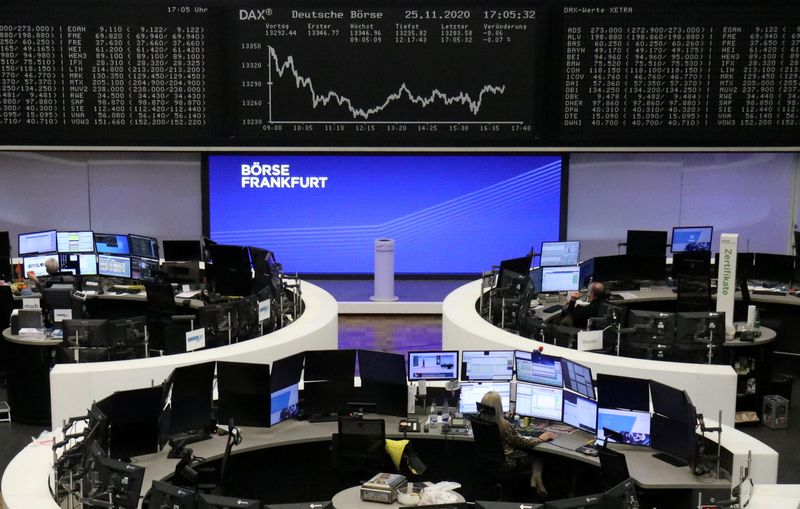(Reuters) – Europe’s benchmark stock index posted its biggest monthly gain on record on the prospect of easing coronavirus restrictions and hopes for a COVID-19 vaccine, but ended Monday lower with eyes on the Brexit trade deal negotiations.
Five weeks ahead of the deadline, talks in London between Britain and the European Union over the weekend were “quite difficult” and “massive divergences” remained on the most thorny elements of fisheries, economic fair play and settling disputes, an EU source said.
“While my belief in a deal being reached is still intact, time is fast running out and you have to wonder how long it can go on before we see a wobble in the markets,” said Craig Erlam, senior market analyst at OANDA Europe.
London’s blue-chip stocks gave up early gains to close down 1.6%, while the pan-European STOXX 600 index lost 1% at the end of a month that saw it surge nearly 14%.
The gains were driven by hopes of a more stable U.S. trade policy under Joe Biden’s presidency, and promising results for major coronavirus vaccine candidates, with Moderna’s application for U.S. and European emergency authorisation on Monday being the latest.
France’s CAC 40 jumped 20% this month, while Spain’s IBEX and Italy’s MIB rose more than 22% each. German shares and UK blue-chips gained more than 12%.
Oil and gas stocks were the biggest decliners in Europe, down 3.4%, with Total SE, BP and Royal Dutch Shell sliding around 5% as crude prices slipped on uncertainty about whether OPEC+ would agree to extend its deep output cuts at talks this week.
At the bottom of the STOXX 600 was Dutch bank ABN Amro, down 8.9% after saying it would cut almost 3,000 jobs by 2024.
Siltronic shares, meanwhile, jumped 7.6% after the German silicon wafer maker said it was in advanced talks to be bought by Taiwan’s GlobalWafers in a 3.75-billion-euro ($4.5 billion) deal.
Germany’s main DAX index gave up its gains at the close, ending down 0.3% with consumer and healthcare stocks leading declines. Data on Monday showed that a newly introduced VAT cut pushed annual consumer prices lower further in November.
(Reporting by Susan Mathew in Bengaluru; Editing by Shounak Dasgupta)
























